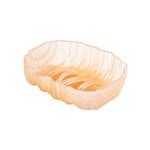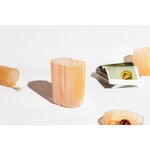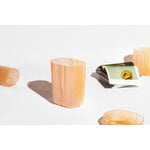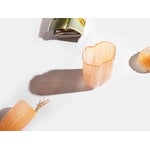Antrei Hartikainen's breathtakingly beautiful Melt bowl is made in cooperation with the Lasismi glass studio in Riihimäki, Finland. The unforgettable design of the mouth-blown Melt dishes draws inspiration from the movements of water and its constant metamorphosis from one form to another – the vivid texture of the glass evokes images of spring ice partially melted by the sun or the surface of a lake in sensual movement, escorted by a light summer breeze. A unique mold technique creates the interesting, three-dimensional appearance of Melt bowl and turns each piece into a delicate and delightful work of art.





Melt bowl, M, peach
Antrei Hartikainen
Description
Antrei Hartikainen's breathtakingly beautiful Melt bowl is made in cooperation with the Lasismi glass studio in Riihimäki, Finland. The unforgettable design of the mouth-blown Melt dishes draws inspiration from the movements of water and its constant metamorphosis from one form to another – the vivid texture of the glass evokes images of spring ice partially melted by the sun or the surface of a lake in sensual movement, escorted by a light summer breeze. A unique mold technique creates the interesting, three-dimensional appearance of Melt bowl and turns each piece into a delicate and delightful work of art.
Product details (8)
- Material
- Mouthblown glass
- Colour
- Orange, white
- Width
- 27 cm
- Depth
- 21 cm
- Height
- 7 cm
- Weight
- 1.7 kg
- Notes
- Please note that each bowl is unique due to the manufacturing technique.
- Care instructions
- Gentle hand wash
- Product ID
Designer
Antrei Hartikainen (b. 1991) is a Finnish designer and master cabinetmaker who likes to play and experiment with different possibilities of wood. A son of a carpenter, Hartikainen has spent his whole life working with wood and has a degree in master cabinetmaking. Hartikainen’s Kukkii sculpture series was awarded the Product of the Year 2017 award in the Finnish design gala Muoto, and his Verso salad utensils won the Golden A' Design Award 2017. In 2018, Hartikainen was given the Young Designer of the Year prize awarded by Design Forum Finland.
Antrei Hartikainen's interview >
View all productsReviews (0)
Sustainability
The Product Sustainability Framework, our criteria of sustainable design, helps you find the most sustainable products in our selection. Read below which sustainability criteria this product has met.
Working conditions & labour 8/9
-
Equal opportunities for all employees
-
Commitment to UN Global Compact, fair compensation for all employees
-
Corporate responsibility requirements defined and communicated for suppliers
-
Systematic work for improved inclusion and well-being in the workplace
-
Transparent supply chain
-
Suppliers' compliance to a code of conduct ensured
-
Compliance to the UN Guiding Principles on Business and Human Rights ensured in the supply chain
-
Support for community involvement in the supply chain
-
Direct suppliers audited and certified
Eco-friendly production 8/9
-
Fair and resource-wise water-use in production
-
No incineration or landfilling of returned items
-
No use of endangered species as materials
-
No direct environmental emissions or waste (excl. GHGs) from production
-
The sustainability of direct suppliers' production is addressed and monitored
-
Production and material sourcing that respect biodiversity, animal rights, and natural ecosystems
-
Material-efficient and ecological packaging
-
No potentially harmful chemicals used in own production
-
Positive impact on nature’s well-being through operations that regenerate natural ecosystems
Climate impact 4/8
-
Company's direct greenhouse gas emissions identified and commitment to reduction
-
Product's carbon impact identified and commitment to reduction
-
Guidance on energy- and eco-efficient use of the product
-
Contribution to climate initiatives beyond the brand’s direct operations
-
Low-carbon or compensated transportation
-
Carbon footprint of the product calculated and goals set to reduce it
-
100 % renewable energy in own production and operations
-
Carbon neutral or carbon negative product
Sustainable materials 5/6
-
Sustainable and long-lasting material choices
-
No harmful or hazardous substances
-
Responsible raw material sourcing and production
-
Materials suited for circularity: monomaterials, recyclable finishings, renewable or recycled contents etc.
-
Ecological materials: natural, biodegradable, recyclable or recycled contents
-
Outstanding materials in terms of innovativeness, responsibility, sustainability and circularity: local production or sourcing, 100 % recycled content, C2C-certification etc.
Circular design 4/5
-
High aesthetic quality promoting long-term use of the product
-
Technically durable product design and material choices
-
Design for enduring life-long quality
-
Design and support for product maintenance, repair and upgradability
-
Innovative circular design solutions: circular service system, resale platform, remanufacturing, collection of used products, etc.







